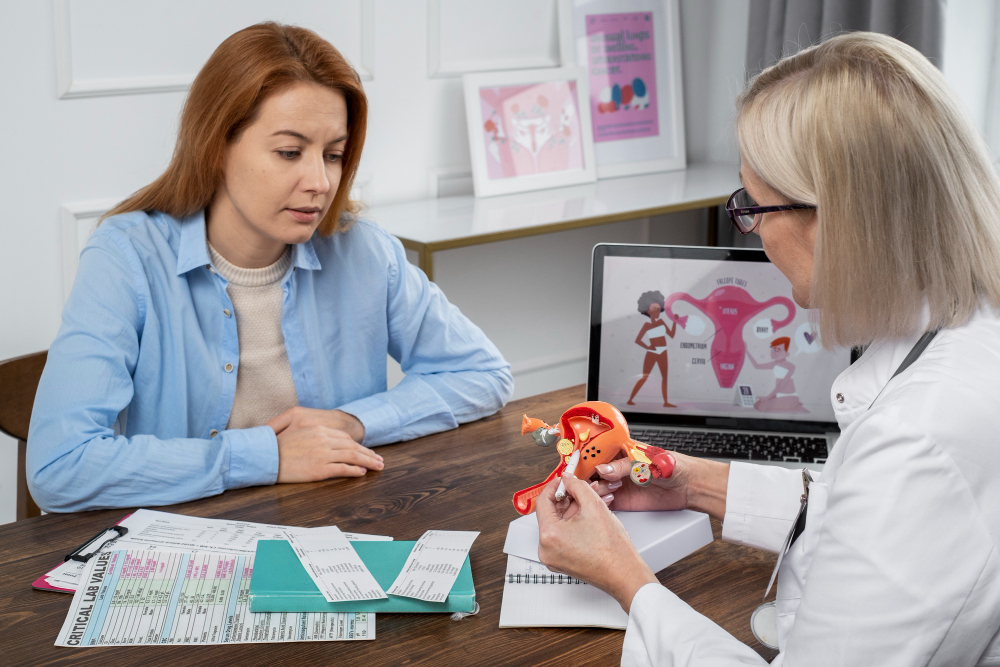For a woman, menstrual health is an integral part of her overall well-being. While many menstrual problems are temporary and transient in nature and do not call for medical treatment, others could be a sign of a serious menstrual problem that could, in some cases, lead to other health concerns that could affect the ability to bear children and perhaps be signs of other serious health issues.
How Often Should an Examination Be Done?
The general rule is that a routine gynecological examination should be done once a year. However, this may vary depending on other health concerns and lifestyle factors. Your gynecologist will recommend the right frequency of examinations for you. When a woman does not experience any menstrual or gynecological problem, it is common to have an “if there’s no problem, why look for one?” attitude. Because of this, serious reproductive health issues that could have been quickly and effectively treated if they had been caught earlier, may be diagnosed only when the condition has reached an advanced stage making treatment and recovery far more difficult. The importance of sticking to the examination schedule advised by your gynecologist cannot be stressed enough.
When Should Regular Examinations Start?
Most gynecologists recommend starting regular examinations between the ages of 13 to 15, irrespective of the onset of puberty. After the first examination, the doctor will advise when the next one should be done. The examination does not typically include a pelvic exam, but the doctor will decide on this. The main focus of the examination will be on:
- Checking the normal development of the sex and reproductive organs.
- Advising on health habits that will work to avoid potential future problems such as smoking, drug use, being overweight, etc.
- Education about sexually transmitted diseases and how to avoid them.
- Basic information about birth control and common menstrual problems.
Preparing for the Examination
Women often feel embarrassed when talking to a doctor about intimate health issues and concerns. A gynecologist is a specialist who is an expert in reproductive health. The doctor’s concern is about your menstrual and reproductive health and not being open about your gynecological issues limits the doctor’s ability to give you the best care.
It is important to keep track of any:
- Recurring pelvic pain
- Unusual feelings of bloating
- Abnormal bleeding
- Abnormal vaginal discharge
- Pain during sexual activity
- Urinary infections
- Vulvar changes
- Unusual nipple discharge
- Any other signs of changes to your reproductive health
What Happens During an Annual Gynecological Examination?
The focus of the examination may vary depending on the specifics of each woman’s health. That said, in general, the examination will include the following:
- Updating your medical history.
- Checking vital health indicators such as blood pressure, cardiac condition and weight, and whether any ailments have affected your reproductive health.
- You will be asked about your periods, sexual activity, efforts to become pregnant or to avoid pregnancy, contraception needs and any other issues that may affect your reproductive health.
- A breast examination will be done.
- A pelvic examination that includes checking the vulva, vagina, cervix, uterus and ovaries will be conducted.
- A pap smear that involves removing a few cells from the cervix and having them tested in a laboratory for any anomalies may be done.
During the examination, you and your doctor may discuss:
- Screening for sexually transmitted diseases and the best ways to prevent them
- Signs of vaginal infections and the right treatment
- Pelvic pains
- Irregular periods and other menstrual problems
- Problems that arise during intercourse/sexual functioning
- Problems with current birth control methods
- Plans to become pregnant and preconception counseling, if required
- Depending on your age, menopausal symptoms may be discussed
- Changes to the breasts
- Urinary leakage, incontinence, and other related problems
- Any post-pregnancy menstrual problems
- Any other reproductive health concerns
Also Read: What is Menopause? – When It Needs Treatment – The 3 Stages of Menopause
You will have an opportunity to ask the doctor about any reproductive health concerns you may have. You can ask about the ways by which you can improve and protect your gynecological health. You can also ask about any lifestyle changes that may be good for you, and any other tests or vaccinations that you could consider for the future.
The old belief that women are the weaker sex has long been disproved. However, while women may be equal to and in some ways even stronger than men, a woman has special health needs that are significantly different from those of a man. Only a gynecologist will be able to provide the reproductive healthcare a woman needs. Reproductive health problems can cause other health concerns and impact quality of life. As important as regular gynecological examinations are, it is necessary to ensure that they are done by highly qualified and experienced gynecological specialists with access to the best examination and diagnostic technology and equipment. For this reason, regular examination at the gynecology department of a leading multispecialty hospital is the best course of action. This is where a woman can be sure of receiving world-class treatment and care, and if any other health problems are affecting gynecological health, other medical specializations too will be available to address them. Having access to a full range of medical specialization services under one roof makes caring for reproductive health much easier.
Being busy is part of leading an active and fulfilling life. However, using lack of time as a reason to avoid or delay your regular gynecological examination could lead to health concerns that could limit your life and activities in many ways.
Frequently Asked Questions
1. How often should I have a gynecological exam?
You should have a gynecological exam once a year, but your doctor may recommend more frequent checkups based on your health needs.
2. At what age should I start gynecological exams?
Regular exams typically start between the ages of 13 and 15, even if a girl hasn’t reached puberty yet.
3. What happens during an annual gynecology exam?
It includes a medical history update, a physical exam, a breast and pelvic examination, and possibly a Pap smear to screen for cervical abnormalities.
4. Can I discuss birth control options during my exam?
Yes, gynecologists can help you choose the best birth control method based on your health and lifestyle.
5. What symptoms should I mention to my gynecologist?
Mention pelvic pain, unusual bleeding, abnormal discharge, pain during intercourse, or any menstrual irregularities during your exam.


